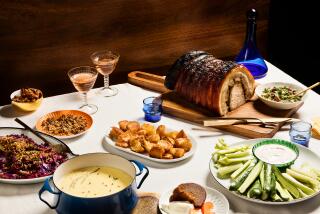Sugar, spice, everyone’s nice
- Share via
For the last 10 years or so, a holiday tradition at our home has been a gingerbread-house decorating party.
We provide bricks and mortar in the form of home-baked walls and fluffy icing, while family and friends bring edible decorations. As the building and landscaping commence, leftover scraps of spicy dough find their way into enough cookies to keep our energy levels up during the heavy construction.
A stress-free respite from the chaos of the holiday season, the day always seems to leave everyone in great spirits. But perhaps this holiday cheer is about more than relaxing with loved ones. The good feelings might also be traced to fresh-baked gingerbread itself.
Like an advent aromatherapy, the spicy odor helps us recall pleasant holidays past. After all, smell is the one sense that stimulates the memory -- and gingerbread’s aroma is irresistible.
The love of this spicy food also could be part biological. In cold climates, such spices are associated with holiday foods such as gingerbread, spiced wine and fruitcakes, says Jeffrey R. Idle, a professor of pharmacology at Charles University in Prague. Idle suggests that these traditional winter spices might actually improve mood during the dark winter months.
Most recipes for gingerbread also contain cloves and nutmeg and sometimes anise and mace. All of these spices contain propenylbenzenes and allylbenzenes, classes of chemical compounds with structures similar to that of amphetamines. When the similarities were first reported 50 years ago, some researchers suggested that these essential oils could be converted into amphetamines after they were eaten.
Studies to determine whether, in fact, the body can convert these oils into mood-elevating compounds have produced conflicting results. In some, lab animals fed extracts of these spices produced chemicals in their urine suggesting that this chemical transformation had taken place. In other studies, the animals produced no such chemicals.
Idle, however, suggests that the spices’ chemicals might be transformed into mood lifters during baking. The spices, when combined with other ingredients and when heated, he says, could theoretically produce amphetamine compounds -- not a lot, but enough that a typical gingerbread man might provide a little Christmas cheer.
Alas, such a direct connection between holiday baked goods and mood has yet to be proved -- no one has scientifically attempted to find, much less measure, these compounds in holiday baked goods.
The amphetamine hypothesis aside, the odor-producing compounds found in spices may still have other biological effects, Idle notes.
In one study, male mice fed extracts of clove and nutmeg became increasingly frisky with their mates. In fact, this “nervous stimulating activity” of the spice-fed mice was comparable to that of mice that had been given Viagra.
Whether we eat spicy foods because we take pleasure in their aromas and flavors, because they evoke warm memories, or because they give us an emotional lift, I’m sure of one thing:
The same friends come back, year after year, to decorate gingerbread houses with us.
Susan Bowerman is a registered dietitian and assistant director of the UCLA Center for Human Nutrition.


